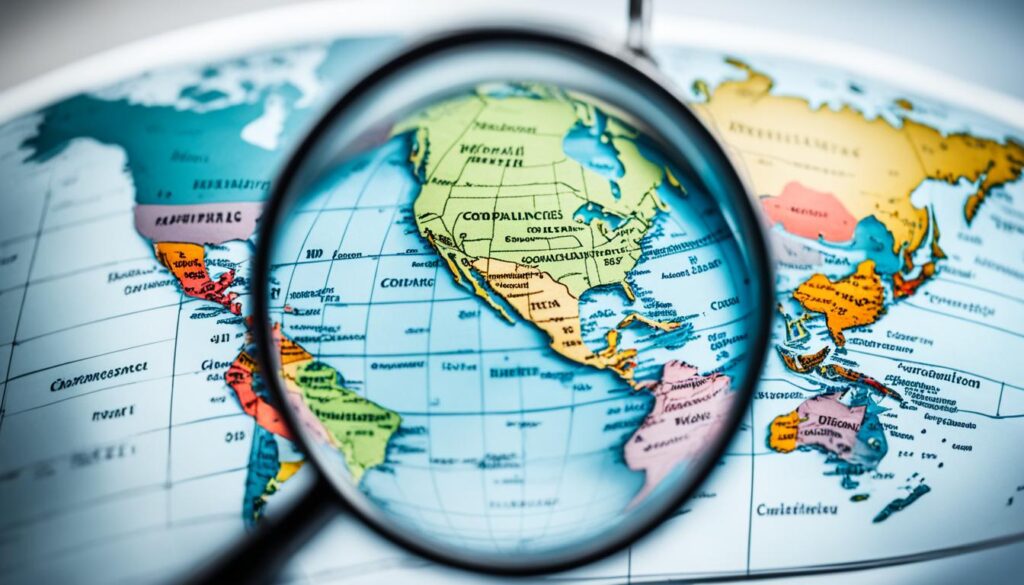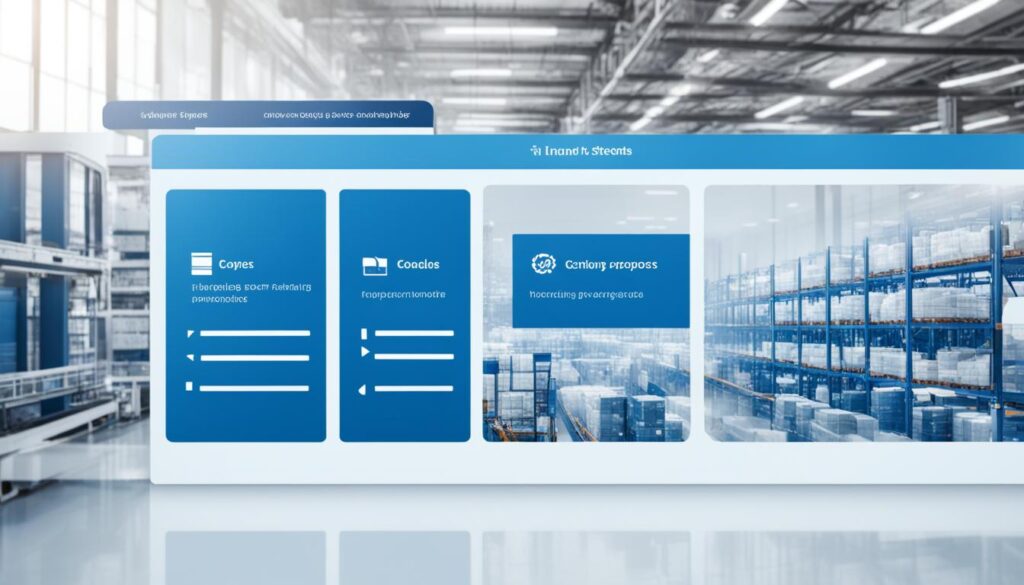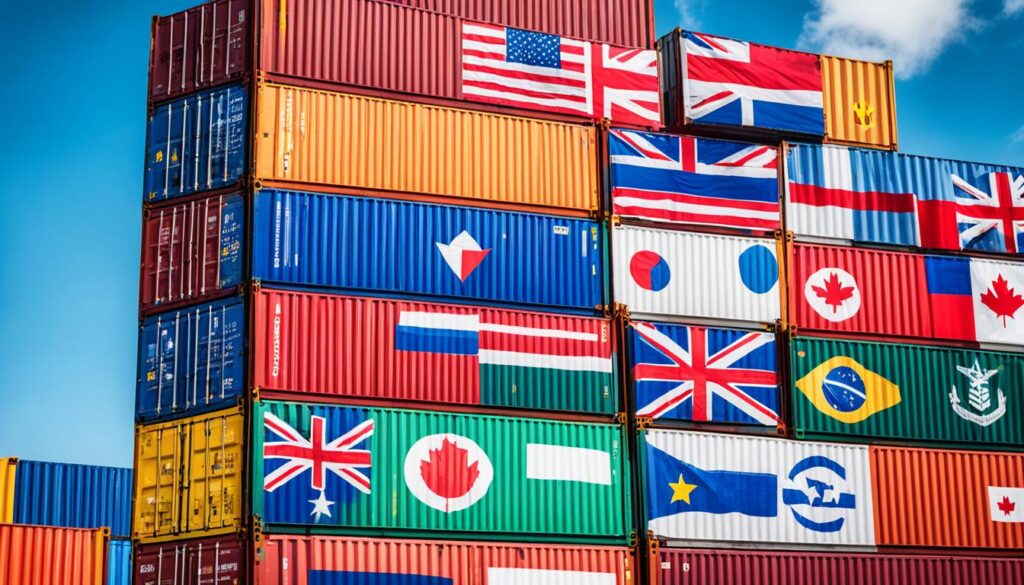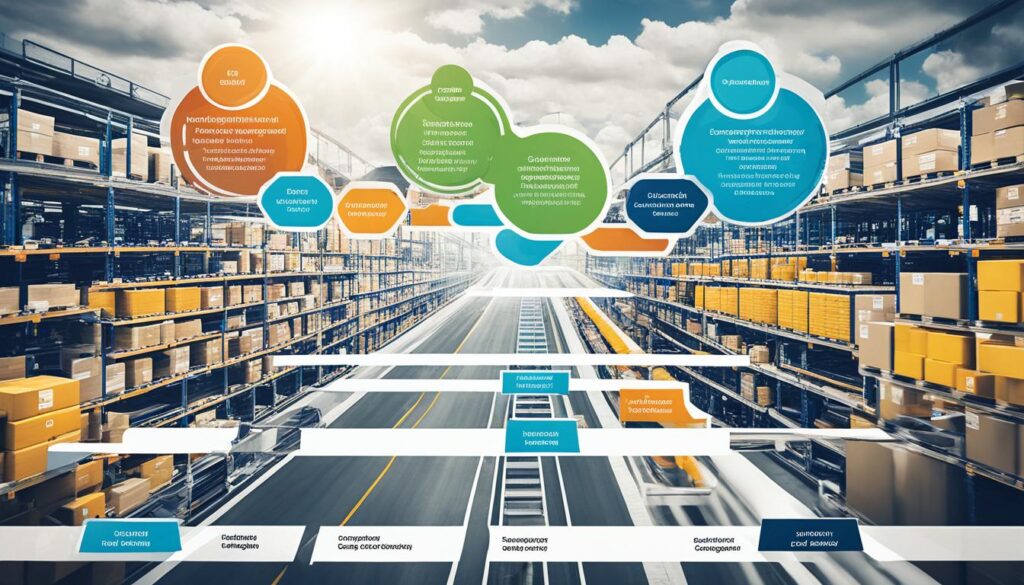Are you confident that your business is fully compliant with international trade laws? Do you understand the potential consequences of non-compliance? Maximizing trade compliance is essential in today’s global marketplace, where regulations are complex and the stakes are high. To ensure the smooth flow of goods across borders and avoid legal pitfalls, businesses must prioritize trade compliance expertise. But where do you begin?
In this article, I will provide valuable tips and insights on how to navigate the intricacies of international trade compliance. From understanding the importance of compliance to leveraging technology and training programs, you’ll discover the key strategies to optimize your global operations. Whether you’re a small business or a multinational corporation, the path to success begins with trade compliance expertise.
Key Takeaways:
- Non-compliance with trade laws can result in severe consequences, including fines and loss of import/export privileges.
- Trade compliance is crucial for accessing new markets, enhancing reputation, and preventing financial and legal ramifications.
- Implementing effective trade compliance programs and providing ongoing training are key steps to maximizing compliance efforts.
- Technology plays a vital role in simplifying compliance tasks, optimizing documentation, and enhancing transaction integrity.
- Understanding legal and ethical considerations, as well as staying up-to-date with regulatory changes, is crucial in navigating trade compliance.
The Importance of Trade Compliance
Trade compliance plays a crucial role in the success of businesses engaged in international trade. By adhering to trade laws and regulations, companies ensure legal compliance, minimize risks, and foster stability in their operations. Compliance goes beyond simply meeting legal requirements; it enables businesses to take advantage of markets governed by trade agreements and preferential tariff systems, enhancing their reputation and brand value while preventing potential financial and legal ramifications.
Non-compliance with trade regulations can lead to severe consequences, including substantial fines, legal actions, reputational damage, and operational disruptions. Therefore, understanding the importance of trade compliance is essential for businesses to thrive in the global marketplace and maintain their competitive edge.
Complying with international trade regulations provides several key benefits for businesses:
- Access to Global Markets: By ensuring trade compliance, companies gain access to international markets governed by trade agreements and preferential tariff systems. This allows them to expand their customer base and increase global trade opportunities.
- Enhanced Reputation and Brand Value: Demonstrating a commitment to compliance enhances a business’s reputation and brand value. Compliance is seen as a sign of trustworthiness, which can attract customers, partners, and investors.
- Risk Mitigation: Trade compliance helps businesses minimize risks associated with international trade, such as penalties, legal actions, and operational disruptions. By understanding and adhering to regulations, companies can navigate the complexities of global trade more effectively.
Overall, trade compliance is not just a legal obligation; it is a strategic advantage that allows businesses to operate smoothly in the global marketplace. By prioritizing trade compliance and implementing robust compliance programs, companies can mitigate risks, ensure legal compliance, and seize opportunities for growth.
“Trade compliance goes beyond meeting legal requirements; it is a strategic advantage that enhances a business’s reputation, minimizes risk, and opens doors to global markets.” – [Name]
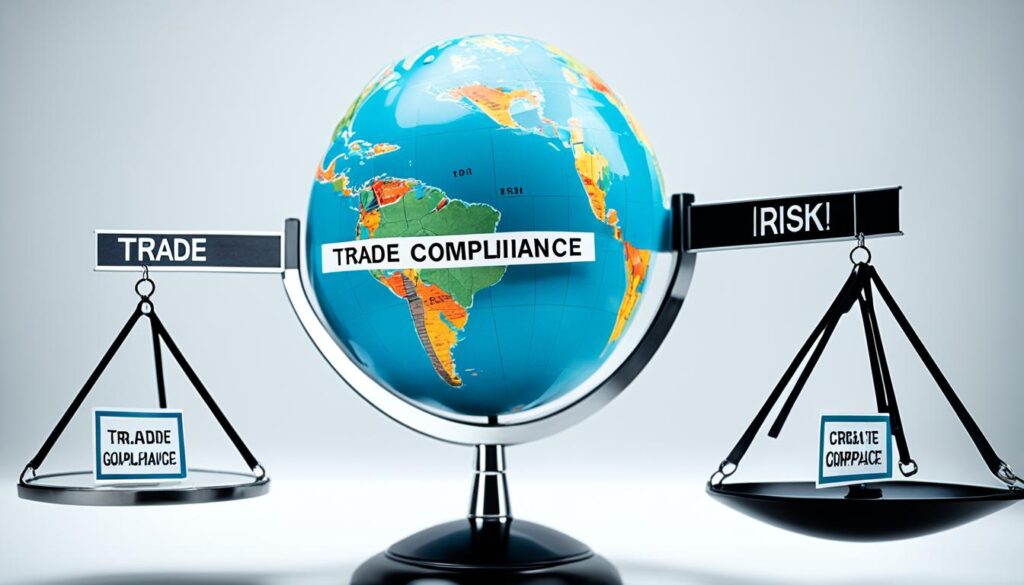
| Benefits of Trade Compliance |
|---|
| Access to Global Markets |
| Enhanced Reputation and Brand Value |
| Risk Mitigation |
Tips for Maximizing Trade Compliance
Implementing effective trade compliance programs is key to optimizing business operations. Here are eight tips to maximize what your compliance program can accomplish:
-
Evaluate your current compliance measures: Conduct a thorough assessment of your existing compliance processes to identify any gaps or areas of improvement.
-
Stay updated with regulatory changes: Regularly monitor and analyze changes in trade laws and regulations to ensure continued compliance.
-
Invest in trade compliance consulting: Seek guidance from experienced trade compliance consultants who can provide expert advice and assist in developing robust compliance strategies.
-
Implement import-export compliance services: Engage specialized import-export compliance service providers to navigate complex trade regulations and ensure adherence to customs requirements.
-
Utilize customs brokerage services: Partner with professional customs brokers to streamline customs clearance procedures and expedite the movement of goods across borders.
-
Regularly train employees: Conduct comprehensive training programs to educate employees on trade compliance regulations, processes, and ethical considerations.
-
Document and maintain records: Establish robust documentation and record-keeping practices to ensure traceability and compliance with regulatory requirements.
-
Continuously assess and improve: Conduct regular audits and evaluations of your compliance program to identify areas for improvement and implement necessary enhancements.
By following these tips and leveraging the expertise of trade compliance professionals, you can enhance your trade compliance program and navigate the complexities of international trade with confidence.
Key Considerations for Maximizing Trade Compliance
| Consideration | Benefits |
|---|---|
| Evaluating current compliance measures | Identify gaps and areas for improvement |
| Staying updated with regulatory changes | Ensure compliance with evolving trade laws |
| Investing in trade compliance consulting | Gain expert guidance and strategy development |
| Implementing import-export compliance services | Navigate complex trade regulations and customs requirements |
| Utilizing customs brokerage services | Streamline customs clearance and ensure smooth movement of goods |
| Regularly training employees | Enhance employee awareness and knowledge |
| Documenting and maintaining records | Ensure traceability and compliance with regulatory requirements |
| Continuously assessing and improving | Identify areas for enhancement and implement necessary changes |
The Role of Trade Compliance Training
Trade compliance training plays a crucial role in cultivating employee awareness and ensuring a culture of integrity within organizations. These training programs provide essential knowledge on trade regulations, ethical considerations, and compliance standards. By imparting industry-specific guidance and real-life case studies, training programs empower employees to understand and navigate the complexities of international trade compliance. It equips them with the necessary skills to recognize potential compliance risks and take appropriate actions to mitigate them.
Developing robust compliance programs and providing ongoing training initiatives are key to staying up-to-date with changing regulations and adhering to established protocols. Continual training ensures that employees are well-informed about the latest compliance requirements and best practices, enabling organizations to navigate global trade compliance with confidence.
“Training is a critical investment in trade compliance. It provides employees with the knowledge and tools they need to uphold ethical standards and comply with trade regulations.”
Trade compliance training programs cover various topics, including:
- The fundamentals of international trade compliance
- Import and export regulations
- Customs processes and documentation
- Risk management and compliance audits
- Trade sanctions and embargoes
- Anti-corruption and anti-bribery measures
- Intellectual property rights protection
These training programs can be tailored to specific industries and job roles, ensuring that employees receive targeted guidance that is relevant to their roles and responsibilities.
Through trade compliance training, organizations foster a compliance-conscious culture that promotes ethical behavior and risk mitigation. It empowers employees to make informed decisions and take the necessary steps to ensure compliance with trade laws and regulations.
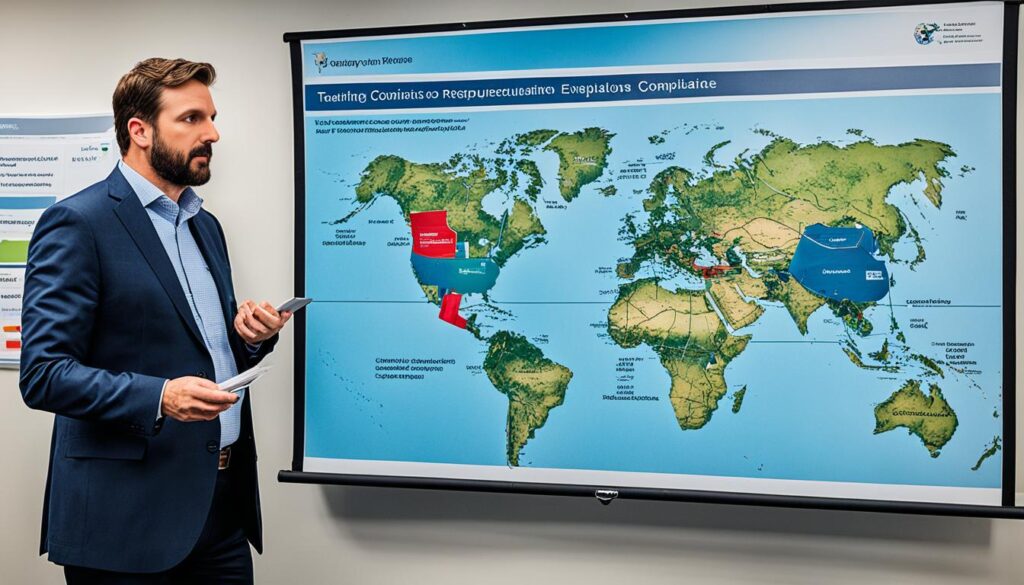
| Benefits of Trade Compliance Training | Impact |
|---|---|
| Enhances compliance awareness | Employees are equipped with the knowledge and understanding of trade regulations and compliance obligations. |
| Reduces compliance risks | Employees can identify potential compliance risks and take proactive measures to prevent violations. |
| Fosters a culture of integrity | Training programs instill ethical values and standards of conduct, promoting a compliant and trustworthy organizational culture. |
| Improves operational efficiency | Employees gain the necessary skills to ensure accurate documentation, streamlined processes, and optimized trade operations. |
| Enables regulatory compliance | By understanding and adhering to trade regulations, organizations avoid penalties, fines, and legal actions. |
Leveraging Technology for Trade Compliance
Technology plays a pivotal role in effectively managing trade compliance in today’s global marketplace. By harnessing the power of trade compliance technology and specialized software solutions, businesses can navigate complex trade regulations with ease and precision.
Compliance software designed specifically for trade purposes offers numerous advantages to businesses. It simplifies the interpretation and implementation of intricate trade regulations, streamlines documentation and record-keeping processes, and enables efficient monitoring and analysis of compliance efforts.
One of the cutting-edge technologies that have revolutionized trade compliance is AI-driven analytics. These advanced analytics tools provide real-time monitoring capabilities, helping organizations stay alert to potential compliance risks and gaps. By leveraging artificial intelligence, businesses can identify anomalies, detect patterns, and proactively address compliance issues before they escalate.
Blockchain-based systems also play a crucial role in enhancing trade compliance. By utilizing blockchain technology, businesses can achieve enhanced transaction integrity, ensuring transparency, traceability, and security throughout the supply chain. This enables businesses to track and verify the origin, destination, and authenticity of goods, minimizing the risk of counterfeit products and fraudulent activities.
Staying up-to-date with technological advancements in trade compliance is key to proactively addressing future regulatory changes and challenges. By investing in trade compliance technology and leveraging specialized software solutions, businesses can optimize compliance management, ensure precision and accuracy, and streamline their overall trade operations.

Legal and Ethical Considerations in Trade Compliance
When it comes to international trade compliance, businesses face a myriad of legal and ethical considerations that vary from country to country. It is essential to navigate these considerations carefully to ensure compliance with legal regulations and maintain ethical standards. Failure to do so can result in penalties, reputational damage, and legal actions. In this section, we explore some of the key legal and ethical considerations businesses need to address in their trade compliance efforts.
Export Controls and Customs Regulations
Export controls and customs regulations play a vital role in trade compliance. Export controls are in place to protect national security and prevent the proliferation of sensitive technologies or goods to unauthorized parties. Businesses must ensure they comply with export control laws and restrictions when engaging in international trade. Additionally, customs regulations govern the movement of goods across borders and require accurate and timely reporting, documentation, and payment of duties and taxes.
Sanctions and Trade Embargoes
Sanctions and trade embargoes are imposed by countries or international organizations to restrict trade with certain countries, entities, or individuals. These measures are often motivated by political or national security concerns. To maintain trade compliance, businesses must stay updated on the sanctions and trade embargoes imposed by relevant authorities and ensure they do not engage in prohibited trade activities with sanctioned entities.
Intellectual Property Rights
Respecting intellectual property rights is crucial in trade compliance. Businesses must ensure they do not infringe on patents, trademarks, copyrights, or trade secrets owned by other entities. This includes being mindful of counterfeit or pirated goods and avoiding the unauthorized use of protected intellectual property.
Anti-Corruption Laws
Compliance with anti-corruption laws is of utmost importance in international trade. Businesses must have robust anti-corruption policies and procedures in place to prevent bribery, facilitation payments, and other corrupt practices. Employee training, clear policies, and detection strategies are essential to identify and address any suspicious situations promptly.
Ethical Considerations in Cross-Cultural Business Practices
Conducting international trade often involves interacting with different cultures and norms. Ethical challenges may arise due to conflicting cultural practices, such as differences in gift-giving customs or interpretation of ethical standards. It is essential for businesses to establish clear policies and guidelines to address these challenges and ensure ethical and compliant business practices globally.
Continual Monitoring and Robust Internal Audits
Compliance with legal and ethical considerations requires ongoing monitoring and robust internal audits. Regular assessments of compliance measures, documentation, and processes help identify areas that require improvement and provide an opportunity to rectify any compliance breaches promptly. Continual monitoring enables businesses to stay ahead of evolving legal and ethical standards in international trade.

The Impact of Varying International Laws on Trade Compliance
International trade operates within a complex matrix of diverse legal and ethical considerations across countries. The lack of harmonization across trading nations poses significant compliance challenges. Changes in national regulations due to foreign affairs further contribute to the dynamic nature of trade compliance. Businesses must adapt swiftly to evolving regulations to ensure seamless cross-border trade operations while upholding ethical and legal standards.
Monitoring regulatory changes, conducting internal audits, and implementing comprehensive compliance measures are crucial in navigating the complexities of global trade compliance. By staying informed and proactive, businesses can mitigate risks, maintain compliance, and foster trust with international partners.
“The diverse legal and ethical considerations in global trade require businesses to be vigilant and adaptable to ensure compliance and preserve business continuity.” – John Wilson, Compliance Advisor
The Challenge of Divergent Regulations
The lack of uniformity in trade regulations across countries presents significant compliance challenges for businesses engaged in international trade. Each country has its own set of customs regulations, import/export controls, and documentation requirements. Navigating these varying regulations while ensuring compliance is a complex task that requires diligent effort and expertise.
Changes in National Regulations
Another aspect that adds to the complexity of trade compliance is changes in national regulations due to political and diplomatic circumstances. Tariff adjustments, trade restrictions, and sanctions imposed by governments can have a profound impact on global trade operations. Businesses must monitor and adapt to these changes swiftly to avoid disruptions in their supply chains and maintain compliance.
Adapting to Evolving Trade Compliance Landscape
To successfully navigate the impact of varying international laws on trade compliance, businesses must adopt proactive measures:
- Stay updated on the latest regulatory changes in target markets
- Establish a robust internal compliance program
- Conduct regular internal audits to identify and address compliance gaps
- Engage legal counsel and trade compliance experts to ensure accuracy and adherence to regulations
By actively managing compliance challenges and adapting to evolving regulatory landscapes, businesses can effectively optimize their global trade operations while maintaining ethical and legal standards.

Comparison of Trade Compliance Challenges in Key Markets
| Market | Key Compliance Challenges |
|---|---|
| United States |
|
| European Union |
|
| China |
|
The table above highlights some of the trade compliance challenges faced in key markets. However, it is important to note that compliance requirements may vary based on industry, product type, and specific trade agreements.
Ensuring Compliance through Training and Technology
When it comes to international trade, ensuring compliance is paramount. To achieve this, businesses need to combine effective training programs with innovative technology solutions. Trade compliance training plays a critical role in cultivating awareness and understanding of regulations while fostering a culture of integrity within organizations. Meanwhile, compliance software solutions streamline compliance tasks, optimize trade operations, and keep businesses up-to-date with regulatory changes.
By integrating training and technology, businesses can enhance their compliance efforts and effectively manage the complexities of global trade compliance. Let’s delve deeper into the importance of trade compliance training and the role of compliance software.
The Importance of Trade Compliance Training
Trade compliance training programs provide employees with essential knowledge on trade regulations, ethical considerations, and compliance standards. Through industry-specific guidance and real-life case studies, employees can understand and navigate the complexities of international trade compliance.
Building a culture of compliance requires ongoing training initiatives that keep employees up to date with changing regulations and best practices. By empowering employees with the right knowledge and skills, organizations can minimize compliance risks and ensure adherence to established protocols.
The Role of Compliance Software
Compliance software solutions offer a range of benefits in trade compliance management. These technologies simplify complex trade regulations, optimize documentation and record-keeping, and provide real-time monitoring and analysis capabilities.
Utilizing compliance software enables businesses to streamline compliance tasks, automate processes, and minimize human error. Advanced technologies, such as AI-driven analytics and blockchain-based systems, enhance transaction integrity, risk assessment, and ensure compliance in real-time.
With compliance software, businesses can proactively address future regulatory changes and challenges, ensuring precision, accuracy, and efficiency in compliance management.
A Holistic Approach to Trade Compliance
To excel in trade compliance, businesses must adopt a holistic approach that combines comprehensive training programs with cutting-edge technology solutions. By providing employees with the knowledge and skills they need and leveraging technology to streamline compliance tasks, businesses can navigate the complexities of global trade compliance with confidence.
Now, let’s take a look at a table that summarizes the key benefits of integrating trade compliance training and technology:
| Benefits of Trade Compliance Training | Benefits of Compliance Software Solutions |
|---|---|
| Builds awareness and understanding of trade regulations | Simplifies complex trade regulations |
| Fosters a culture of integrity within organizations | Optimizes documentation and record-keeping |
| Minimizes compliance risks | Enables real-time monitoring and analysis |
| Ensures adherence to established compliance protocols | Enhances transaction integrity and risk assessment |
In conclusion, ensuring compliance in international trade requires a strategic combination of effective training programs and the utilization of technology. By prioritizing trade compliance training and implementing compliance software solutions, businesses can enhance their compliance efforts, stay up-to-date with regulatory changes, and effectively manage the complexities of global trade compliance.
Conclusion for Ensuring Global Trade Compliance Expertise
Ensuring global trade compliance expertise is crucial for businesses engaged in international trade. Compliance with trade laws and regulations is essential to avoid legal consequences, minimize risks, and optimize operations. By prioritizing compliance, businesses can access new markets, enhance reputation, and mitigate financial and operational disruptions.
Implementing effective compliance programs, providing comprehensive training, and leveraging technology are key steps in achieving and maintaining global trade compliance expertise.
Investing in trade compliance services and solutions, such as customs compliance software and customs brokerage services, can help businesses navigate the complexities of international trade regulations. These services provide the necessary guidance and support to ensure compliance with import-export laws, regulatory requirements, and customs procedures.
Collaborating with trade compliance consulting firms can also offer valuable insights and expertise, helping businesses develop robust compliance programs and stay updated with changing regulations. Professional consultants can provide specialized knowledge in areas such as import-export compliance, global trade compliance, and regulatory compliance solutions.
By combining trade compliance consulting, import-export compliance services, and customs brokerage services with cutting-edge technology and comprehensive training programs, businesses can achieve a high level of trade compliance proficiency. A well-rounded approach that encompasses people, processes, and technology is essential for maintaining compliance and maximizing the benefits of international trade.
Benefits of Ensuring Trade Compliance Expertise
Ensuring global trade compliance expertise offers several advantages for businesses:
- Legal Compliance: Trade compliance services, such as customs compliance solutions, help businesses comply with trade laws, regulations, and customs procedures, avoiding penalties, fines, and legal consequences.
- Operational Efficiency: By implementing effective compliance programs, businesses can streamline their import-export processes, reducing delays, disruptions, and costs associated with non-compliance.
- Market Access: Trade compliance expertise enables businesses to access new markets, trade agreements, and preferential tariff systems, expanding their global reach and enhancing competitiveness.
- Reputation and Brand Value: Maintaining a strong trade compliance program improves a company’s reputation, fosters trust among customers and partners, and enhances brand value as a reliable and compliant trading partner.
- Risk Mitigation: Compliance with trade regulations minimizes the risks associated with trade, such as smuggling, fraud, intellectual property infringements, and non-compliant transactions.
Get Started with OCR Global Trade Management
OCR Global Trade Management is a trusted provider of trade compliance services and solutions. With over 40 years of experience in the industry, OCR assists businesses in optimizing their trade compliance programs. From trade compliance consulting to import-export compliance services and customs brokerage services, OCR offers comprehensive solutions tailored to meet the unique needs of each business.
By leveraging cutting-edge trade compliance technology and industry expertise, OCR helps businesses navigate the complexities of global trade regulations. Streamline your compliance management, ensure legal compliance, and maximize the benefits of international trade by partnering with OCR Global Trade Management.
Contact OCR Global Trade Management today for a product demonstration or consultation to enhance your trade compliance program and achieve global trade compliance expertise.
| Benefits of Ensuring Trade Compliance Expertise |
|---|
| Legal Compliance |
| Operational Efficiency |
| Market Access |
| Reputation and Brand Value |
| Risk Mitigation |
About OCR Global Trade Management
OCR Global Trade Management is a leading provider of trade compliance services, helping businesses worldwide optimize their trade compliance programs. With over 40 years of experience and a team of global trade experts, OCR is dedicated to assisting organizations in navigating the complexities of international trade compliance.
At OCR Global Trade Management, we understand the critical importance of trade compliance in today’s global marketplace. Our comprehensive range of trade compliance services covers all aspects of regulatory compliance, enabling businesses to mitigate risks, ensure legal compliance, and optimize their global trade operations.
Our expertise includes implementing robust audit trails and effective license management systems, as well as leveraging cutting-edge automation technology to streamline compliance processes. We work closely with our clients to develop customized trade compliance solutions tailored to their unique business needs.
When you partner with OCR, you gain access to our deep industry knowledge, state-of-the-art software solutions, and a team of experienced trade compliance professionals. We are committed to helping you achieve trade compliance excellence and staying ahead of rapidly changing regulatory landscapes.
Contact OCR Global Trade Management today for a product demonstration or consultation, and let us optimize your trade compliance program for enhanced efficiency and peace of mind.
Additional Resources for Trade Compliance
Enhance your knowledge of trade compliance with additional resources and references. Explore global trade compliance websites, industry-specific publications, and regulatory databases for comprehensive information on trade compliance regulations, best practices, and updates. Stay informed and continuously improve your trade compliance program by utilizing these valuable resources.
Recommended Trade Compliance Websites
- Export.gov Trade Compliance
- U.S. Customs and Border Protection
- Office of the United States Trade Representative
Industry-Specific Trade Compliance Publications
- Journal of Commerce (JOC)
- International Chamber of Commerce (ICC)
- Trade Compliance Association (TCA)
Regulatory Databases for Trade Compliance
- Federal Register
- U.S. International Trade Commission Harmonized Tariff Schedule
- U.S. Department of the Treasury – Sanctions List Search
“Staying updated with the latest trade compliance regulations and best practices is essential for businesses to succeed in the global marketplace. By utilizing these additional resources, you can strengthen your compliance program and ensure adherence to global trade regulations.”
| Resource | Description |
|---|---|
| Export.gov Trade Compliance | Official website providing comprehensive trade compliance information and resources |
| U.S. Customs and Border Protection | Government agency responsible for enforcing trade laws and regulations |
| Office of the United States Trade Representative | Organization responsible for negotiating and enforcing trade agreements |
| Journal of Commerce (JOC) | Industry-specific publication covering global trade and logistics news |
| International Chamber of Commerce (ICC) | Global business organization providing resources on international trade |
| Trade Compliance Association (TCA) | Professional association offering trade compliance resources and training |
| Federal Register | Official daily publication for notices and regulations of the U.S. government |
| U.S. International Trade Commission Harmonized Tariff Schedule | Database providing tariff rates and classifications for imported and exported goods |
| U.S. Department of the Treasury – Sanctions List Search | Database for checking individuals and entities subject to U.S. economic sanctions |
Get Started with Trade Compliance Expertise
When it comes to optimizing your trade compliance program, partnering with trade compliance experts is the first step to success. Whether you need consulting services, automated solutions, or comprehensive trade compliance management, professionals like OCR Global Trade Management are here to provide the expertise you need. With their years of experience, cutting-edge technology, and deep industry knowledge, they can help ensure compliance and enhance your global trade operations.
By leveraging OCR Global Trade Management’s services, you can tap into their wealth of experience in international trade compliance. They offer a range of trade compliance services, including strategic consulting, regulatory analysis, and risk management. Their team of experts will work closely with you to understand your specific compliance needs and develop customized solutions that align with your business objectives.
OCR Global Trade Management’s advanced technology solutions are designed to streamline trade compliance processes and improve efficiency. From automated compliance checks to comprehensive reporting and analytics, their software can help you navigate the complexities of international trade compliance with ease. With OCR Global Trade Management as your partner, you can confidently navigate trade compliance and focus on growing your business.
